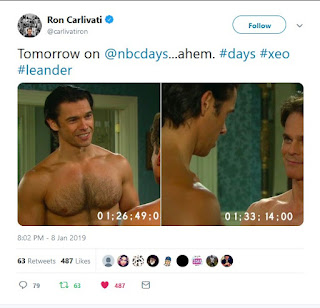Movie Review - Gleason
In 2015, President Barack Obama signed the Steve Gleason Act into law, which provides Medicare and technological assistance to people with ALS. This documentary tells the story of Steve Gleason and the origin of the law. Gleason is a retired, NFL player who was diagnosed with ALS or what's commonly referred to as Lou Gehrig's disease. Not long after his diagnosis, in 2011, he learned his wife, Michel, was pregnant with their son. Gleason decided to start making home videos of himself talking to the camera, addressing his future son when he is older and presumably when Gleason is dead. The videos are meant to impart knowledge, advice or revelations about himself to his son.
Clay Tweel came along or somehow became responsible for directing the day-to-day and week-to-week filming of Gleason's household, which seems like it went on for the better part of four years. There are numerous set-ups all over their house, even in his wife's delivery room, and what seems like a handheld operator constantly following them as they raise their child, capturing so many, if not almost all intimate moments, including assisted bowel movements. There appears to be so much footage that the true task is the editing, which Tweel and his co-editor do extremely well.
At the first birthday of his son, Tweel establishes an idea between Gleason and his child that isn't spoken, a powerful idea and image that's bred out through the camerawork and the editing. The idea or image is that Gleason is becoming like a baby as his baby is becoming like him. It's sad to see Gleason grow more and more disabled, as ALS basically paralyzes his entire body. The heavy emotion doesn't hit until one scene where Gleason's child is two and is learning to talk, while at the same time Gleason is in his 30's and is losing his ability to talk. It registers as cute to see a helpless human being known as a baby sitting in front of you but not as cute when that helpless human being is a 35-year-old, former linebacker.
It's perfect to underscore the documentary's theme, which Gleason openly states is the relationship of fathers and sons. There isn't any organization or structure to Gleason's videos, which seem like they're being compiled on his blog or website. He basically just talks about his childhood and marriage, as he extrapolates lessons or whatever. A source of tension is Gleason's back-and-forth with his own father, but there is a distance between us and that back-and-forth, which the movie never really bridges.
Initially, there is some kind of issue where Gleason's father pushes prayer or religion as a way of healing his son. Gleason gets annoyed at his father because Gleason doesn't agree with the so-called faith-healing. He has a sense of faith that jumps out as strong, but, beyond saying it, Gleason doesn't go deeper with it. He doesn't seem as religious, but, at one point, Gleason asks, "God, why me?" and it speaks to his level of faith but it also speaks to the movie's general myopia.
Gleason does start a charity foundation, which helps other people suffering from ALS, but the movie really limits our perspective to Gleason and his family. It's almost as if he's the only person dealing with ALS or fighting it. Hearing from other men or women with ALS or doctors who specialize in it would have been appreciated in this film.
Four Stars out of Five.
Rated R for language.
Running Time: 1 hr. and 50 mins.
Clay Tweel came along or somehow became responsible for directing the day-to-day and week-to-week filming of Gleason's household, which seems like it went on for the better part of four years. There are numerous set-ups all over their house, even in his wife's delivery room, and what seems like a handheld operator constantly following them as they raise their child, capturing so many, if not almost all intimate moments, including assisted bowel movements. There appears to be so much footage that the true task is the editing, which Tweel and his co-editor do extremely well.
At the first birthday of his son, Tweel establishes an idea between Gleason and his child that isn't spoken, a powerful idea and image that's bred out through the camerawork and the editing. The idea or image is that Gleason is becoming like a baby as his baby is becoming like him. It's sad to see Gleason grow more and more disabled, as ALS basically paralyzes his entire body. The heavy emotion doesn't hit until one scene where Gleason's child is two and is learning to talk, while at the same time Gleason is in his 30's and is losing his ability to talk. It registers as cute to see a helpless human being known as a baby sitting in front of you but not as cute when that helpless human being is a 35-year-old, former linebacker.
It's perfect to underscore the documentary's theme, which Gleason openly states is the relationship of fathers and sons. There isn't any organization or structure to Gleason's videos, which seem like they're being compiled on his blog or website. He basically just talks about his childhood and marriage, as he extrapolates lessons or whatever. A source of tension is Gleason's back-and-forth with his own father, but there is a distance between us and that back-and-forth, which the movie never really bridges.
Initially, there is some kind of issue where Gleason's father pushes prayer or religion as a way of healing his son. Gleason gets annoyed at his father because Gleason doesn't agree with the so-called faith-healing. He has a sense of faith that jumps out as strong, but, beyond saying it, Gleason doesn't go deeper with it. He doesn't seem as religious, but, at one point, Gleason asks, "God, why me?" and it speaks to his level of faith but it also speaks to the movie's general myopia.
Gleason does start a charity foundation, which helps other people suffering from ALS, but the movie really limits our perspective to Gleason and his family. It's almost as if he's the only person dealing with ALS or fighting it. Hearing from other men or women with ALS or doctors who specialize in it would have been appreciated in this film.
Four Stars out of Five.
Rated R for language.
Running Time: 1 hr. and 50 mins.











Comments
Post a Comment